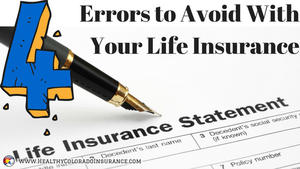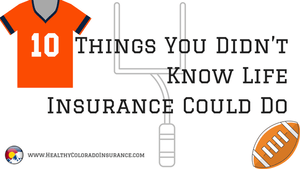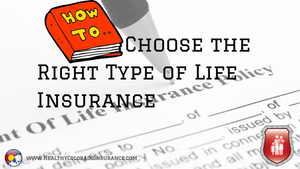
Want to learn more and see what plans are out there for you? Contact our Local and Licensed Medicare Agents
Why Life Insurance?
When you want to provide financial security to those who matter most to you, life insurance is a good place to start. It can protect your loved ones by providing a death benefit, so they have one less thing to worry about during difficult times. Some policies also build cash value you can use if you need it. Healthy Colorado Insurance offers multiple types of life insurance, from over 50 different companies, to match your needs and budget, so you can get the confidence of knowing you’re covered.

Why Life Insurance?
- Life Insurance Basics
- How Much Life Insurance Is Enough?
- Navigating Life Insurance
- Life Insurance Policies and Cash Value
- Life Insurance – Quote and Apply
Individual Life Insurance can be important for:
- A source of savings – If not paid out by death benefit, some types of life insurance can have a cash value.
- Final expenses – using life insurance to pay for funeral and burial expenses.
- Income for dependents – a life policy can provide much needed income for your dependents when you die. Many times this is used for children, but can also be used for a partner that has a loss of income.
- Inheritance – using a life insurance policy as a inheritance even if you don’t have substantial assets to pass on to your beneficiaries.
- Used to pay taxes
- Making a charitable contribution
Permanent Or Term Insurance: Which Makes Sense For You?
In a very broad sense, there are two types of life insurance: permanent life insurance and term life insurance.
Permanent life insurance is a type of life insurance that can stay in force for your entire life, as long as you pay your premiums in full. Permanent life insurance usually, but not always, builds cash value for you that you can use for expenses later in life. On the other hand, Other characteristics of term insurance include:
- Low cost
- No cash value
- Usually renewable
- Sometimes convertible to permanent life insurance term life insurance is only in force for a specified amount of time: usually 10, 15, 20 or 30 years. At the end of the term, your coverage expires and you will need to either convert your policy to a permanent life insurance plan (if available) or purchase a new policy for a new term. To counter the drawback of an expiration date, you will find that term life insurance is somewhat less expensive than permanent life insurance.
Which Is Right For You?
The answer lies with what you’re trying to accomplish by having a life insurance policy. Are you insuring your life so that when you pass away your children will be able to go to college and your spouse will be able to pay off the mortgage?
These are temporary concerns and so a temporary form of life insurance – term life – is best suited to address them. On the other hand, someone who is concerned about providing income to a widow or widower for life, funding retirement, or passing wealth to a future generation will find permanent life insurance as a better suited to address these goals. Always ask yourself why you need your life insurance policy. If it’s for a temporary goal, then term insurance is probably best. However, if it’s to address a long-term need or concern, then it’s time to start looking at permanent policies.
Protect the ones you loves. You buy life insurance because it is the best way to protect your loved ones. It is a financial decision…kind of. It is an emotional decision…sort of. It is about love and caring and future…most definitely.
Still, millions of people buy life insurance every year for reasons that are often difficult to express. At the same time, the reasons are simple and obvious. That’s the thing about life insurance. The idea may be simple, but the reasons behind it cut deep, to our very core, almost to an instinctive level.
At the heart of it, if you are like most people, you do so for six very good reasons
#1 - LIFE INSURANCE IS ABOUT TAKING CARE OF LOVED ONES.
It is about meeting responsibilities and keeping promises. If you own life insurance, it is because you view it from your family’s point of view, not your own. You see life insurance as a tool that protects your spouse and children from the potentially devastating financial losses that can result if you die prematurely.
#2 - LIFE INSURANCE IS FOR THE LIVING.
It has nothing to do with you. You know that, should anything happen to you, the life insurance you have purchased is in place to protect and provide financial relief for those who must carry on without you. It’s about them.
#3 - LIFE INSURANCE IS AN EXPRESSION OF LOVE AND CARING.
Because you care about your family, you want to ensure their financial security if you’re suddenly not around to do so.
#4 - SHOULD YOU DIE, THE PROCEEDS WILL HELP YOU KEEP THE PROMISES YOU HAVE MADE TO THOSE PEOPLE WHO ARE IMPORTANT TO YOU.
By protecting their financial future, you’re enabling your loved ones to maintain their lifestyle, if something unexpected should happen to you.
#5 - LIFE INSURANCE BUYS TIME AND OPTIONS.
Too often, when an income earner dies, survivors are forced to make tough, dramatic decisions—and to do so quickly—at a time when they may not be emotionally in a position to make good choices. Life insurance gives survivors a chance to adjust over time rather than need to look right away for a downsized home or new job.
Your life insurance gives your family choices by providing the benefits to help pay off debts; to help meet housing payments, and ongoing living expenses; to help fund college educations for your children or grandchildren; and more.
#6 - LIFE INSURANCE PROVIDES CASH WHEN IT’S NEEDED MOST.
Your life insurance policy can deliver a specified sum of money at the exact time of need. Upon your death, your family can be assured that the amount you have chosen—perhaps hundreds of thousands of dollars; maybe even millions—will be there almost immediately. And that death benefit is generally not subject to federal income taxes. For example, a $500,000 policy provides $500,000 in death benefit proceeds.
If you are not completely certain that your coverage is in line with your family’s needs, please contact your New York Life agent. When you meet, you’ll work together to determine how much coverage you need, review what products and policy are right for you, and review cost comparisons.
We’re always here to help you make the best decisions based on your individual needs, current situation, and long-term goals. Don’t have an agent?
Contact us to ask questions.




